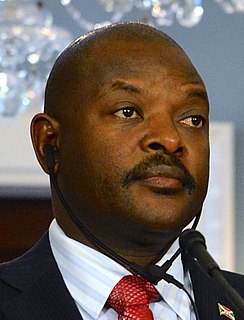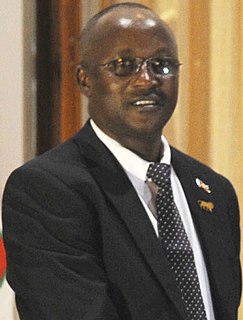Related Research Articles

Politics of Burundi takes place in a framework of a transitional presidential representative democratic republic, whereby the President of Burundi is both head of state and head of government, and of a multi-party system. Executive power is exercised by the government. Legislative power is vested in both the government and the two chambers of parliament, the Senate and the National Assembly.

Burundi is one of the few countries in Africa, along with its closely linked neighbour Rwanda among others, to be a direct territorial continuation of a pre-colonial era African state.

The President of Burundi, officially the President of the Republic, is the head of state and head of government of the Republic of Burundi. The president is also commander-in-chief of the National Defence Force. The office of the presidency was established when Michel Micombero declared Burundi a republic on 28 November 1966. The first constitution to specify the powers and duties of the president was the constitution of 1974 adopted in 1976. The constitution, written by Micombero, affirmed Micombero's position as the first president of Burundi. The powers of the president currently derive from the 2005 constitution implemented as a result of the 2000 Arusha Accords after the Burundian Civil War. The current president is Pierre Nkurunziza, who has held office since being elected first president of the post-transition republic on 19 August 2005.

Domitien Ndayizeye is a Burundian politician who was President of Burundi from 2003 to 2005. He succeeded Pierre Buyoya, as president on 30 April 2003, after serving as Buyoya's vice president for 18 months. Ndayizeye remained in office until succeeded by Pierre Nkurunziza on 26 August 2005.

The Front for Democracy in Burundi is a Hutu progressive political party in Burundi.

The Union for National Progress is a nationalist political party in Burundi, receiving most of its support from members of the Tutsi ethnic group. It is celebrated for its role in gaining Burundian independence.

The National Council for the Defense of Democracy–Forces for the Defense of Democracy is the current ruling party in Burundi. During the Burundian Civil War, the CNDD-FDD was the most significant rebel group active and became a major political party in Burundi. In March 2012, Pascal Nyabenda was elected as President of CNDD-FDD. Then on 20 August 2016, General Evariste Ndayishimiye was, in the extraordinary congress that took place in Gitega, elected as the Secretary General of the Party.

Pierre Nkurunziza is a Burundian politician who has been in power in Burundi since 2005. He was the Chairman of the National Council for the Defense of Democracy-Forces for the Defense of Democracy (CNDD-FDD), the ruling party, until he was elected as President of Burundi.

The National Assembly is the lower chamber of Parliament in Burundi. It consists of 100 directly elected members and between 18 and 21 co-opted members who serve five-year terms.

The Senate is the upper chamber of Parliament in Burundi. It consists of between 37 and 54 members who serve 5-year terms. The current Senate was elected on 24 July 2015 and consists of 43 members.

The position of Vice-President of the Republic of Burundi was created in June 1998, when a transitional constitution went into effect. It replaced the post of Prime Minister.
Alice Nzomukunda is a Burundian politician and former Second Vice-President of the country, from 29 August 2005 to 5 September 2006. She is an ethnic Hutu and was a member of the National Council for the Defense of Democracy-Forces for the Defense of Democracy (CNDD-FDD).

In 2007 the Government of Burundi consisted of a 20-member Council of Ministers appointed by the President. The Council of Ministers, together with the President and Vice-Presidents, forms the executive branch of government in the country.
Marina Barampama is a Burundian politician. She was elected Second Vice President on 8 September 2006, replacing Alice Nzomukunda. She remained in post for six months, until she was sacked for her support of Hussein Radjabu. Formerly a member of the National Council for the Defense of Democracy-Forces for the Defense of Democracy (CNDD–FDD), she is now General Secretary of the Union for Peace and Development.
The People's Progressive Alliance is a political party in Mauritania.

Parliamentary elections were held in Burundi on 29 June 2015. The vote had been initially set for 5 June 2015, alongside local elections, but it was delayed due to unrest. Indirect elections to the Senate occurred on 24 July.

Presidential elections were held in Burundi on 21 July 2015. President Pierre Nkurunziza ran for a third term despite controversy over whether he was eligible to run again. The opposition boycotted the vote, and Nkurunziza won re-election.

On 25 April 2015, the ruling political party in Burundi, the National Council for the Defense of Democracy – Forces for the Defense of Democracy (CNDD-FDD), announced that the incumbent President of Burundi, Pierre Nkurunziza, would run for a third term in the 2015 presidential election. The announcement sparked protests by those opposed to Nkurunziza seeking a third term in office.

Gaston Sindimwo is a Burundian politician, serving as the First Vice President of Burundi, under President Pierre Nkurunziza, since his inauguration on August 20, 2015. Sindimwo is also the Secretary-General of the Union for National Progress (UPRONA), and was previously the Deputy-Private Secretary at the Office of the First Vice-President.
References
- ↑ "Burundi vice president resigns, is replaced amid growing tensions", Associated Press (International Herald Tribune), 8 November 2007.
- ↑ "Démission du premier vice-président burundais" Archived 2012-07-21 at Archive.today , Panapress (afriquenligne.fr), November 8, 2007 (in French).
- 1 2 "Burundi elects new vice president" [ permanent dead link ], Panapress (afriquenligne.fr), November 9, 2007.
- ↑ "L'ancien vice-président burundais à la recherche d'un emploi", Panapress (afriquenligne.fr), November 14, 2007 (in French).
| Political offices | ||
|---|---|---|
| Preceded by Frédéric Ngenzebuhoro | First Vice-President of Burundi 2005–2007 | Succeeded by Yves Sahinguvu |
| This article about a Burundian politician is a stub. You can help Wikipedia by expanding it. |